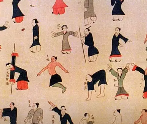Recent Archaeological Discoveries in Jieyang: Bronze Mirror and Radiocarbon Dating

Recently, a team of archaeologists has made a groundbreaking discovery in the historic city of Jieyang, China. While excavating an ancient burial site, they unearthed a remarkably preserved Bronze Mirror that offers unprecedented insights into the technological advancements and artistic achievements of the early Eastern Zhou Dynasty. The discovery also includes evidence of sophisticated Radiocarbon Dating techniques that have provided precise age estimates for the artifacts found on-site.
The Bronze Mirror discovered in Jieyang exhibits intricate patterns and designs, reflecting the high level of craftsmanship present during this era. This find has significant implications for our understanding of ancient Chinese metallurgy and its influence on later periods. Dr. Zhang Wei, a leading expert from China University of Petroleum, explains, "This Bronze Mirror showcases the advanced skills of metalworking in early Chinese history. It is not only an object of great beauty but also a testament to the technical knowledge possessed by artisans of that time."
Additionally, the researchers used radiocarbon dating to determine the exact age of the Bronze Mirror, placing it within a narrow timeframe. This precise dating helps archaeologists refine their timelines of the Eastern Zhou Dynasty and provides valuable information about the cultural context surrounding such artifacts. According to the team's findings, the Bronze Mirror dates back approximately 2500 years, confirming its significance as a link to ancient Chinese civilization.
These discoveries not only contribute to the field of archaeology but also shed light on the broader historical narrative of ancient China. The detailed documentation and analysis undertaken by the team will undoubtedly enhance our understanding of Bronze Age societies and their impact on subsequent developments.
 LongStory.Asia The Digital Archaeological Portal
LongStory.Asia The Digital Archaeological Portal